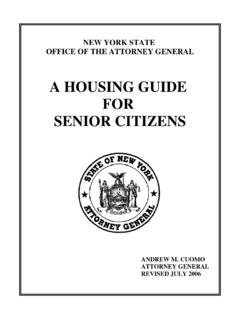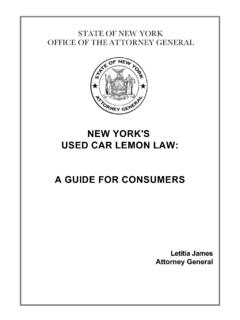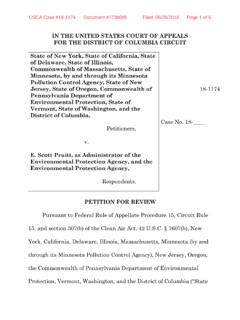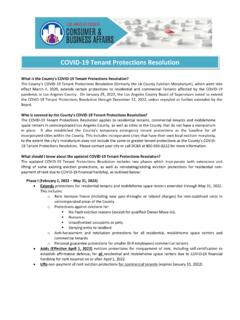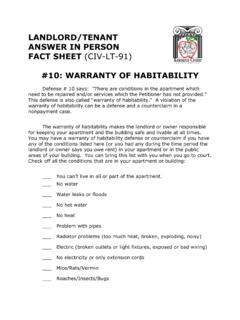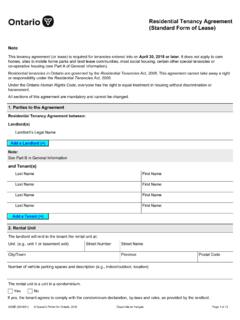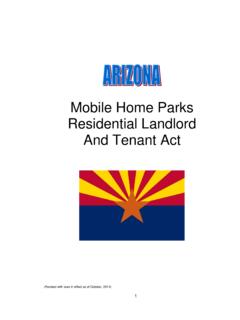Transcription of Tenant Harassment - Attorney General of New York
1 Tenant HarassmentProtections for Tenants Living in New York CityEnglishDear Friends,As a Tenant , you have the right to live peacefully in your home without being harassed by your landlord. Tenant Harassment can take many forms; from threats, to cutting off essential services like heat or hot water, to causing damage to your home or apartment. Whether your landlord is engaging in Harassment to force you out, retaliate against you for making a complaint or asserting your rights, or for some other reason; there are protections in place to stop it. This publication contains information about your rights as a Tenant , as well as resources to assist you if you are being harassed by your landlord.
2 Sincerely,New York StateAttorney Geneal Letitia JamesProtections for Tenants Facing Retaliation in New York State It is illegal for landlords in New York to retaliate against tenants who make a good faith complaint to them or to a government agency. These complaints may include violations of health and safety laws, issues with habitability or non-repair of the premises, or violations of rights under a lease. All tenants* are protected from this kind of retaliation by law. It is presumed that a landlord is retaliating if: Within one year of a Tenant s complaint, the landlord substantially alters the terms of the Tenant s rental agreement. This includes: refusing to continue to rent to you; failing to renew a lease after your lease has expired; or offering a new lease with an unreasonable rent increase.
3 Within one year of making a good faith complaint, your landlord brings an eviction case against you. If you inform the court that you made such a complaint within one year of the eviction proceeding, the law requires your landlord to show that the eviction isn t retaliatory. The eviction proceeding will be terminated if your landlord fails to prove that the eviction was not found to have illegally retaliated against tenants are subject to fines and fees.* Includes all tenants except those living in owner-occupied dwellings with fewer than four for Rent Stabilized and Rent Controlled Tenants Landlords are prohibited from harassing tenants living in rent controlled or rent stabilized apartments.
4 Under New York State s Rent Regulation Laws, Harassment is defined as conduct by a landlord that directly or indirectly interferes with, or is intended to interfere with, your privacy, comfort, and enjoyment of your dwelling. If you are living in a rent-stabilized or rent-controlled apartment, you can file a complaint with New York State Homes and Community Renewal (HCR) at (866) ASK-DHCR ((866) 275-3427) or by visiting An apartment is rent controlled if it has been occupied continuously by a Tenant since July 1, 1971 and the building was constructed before February 1, 1947. In most cases, an apartment is rent stabilized if it is in a building constructed before January 1, 1974 and the building has six or more units.
5 See page 8 and 9 in this publication for additional Protections for Tenants in New York CityNew York City s Housing Maintenance Code defines Harassment as an act or omission by a landlord that causes or intends to cause you to leave your home or give up your rights as a Tenant . Under this law a landlord may NOT: Use force or threaten to use force against a Tenant ;Destroy a Tenant s property; Knowingly provide false or misleading information about whether a unit is rent stabilized or controlled; Discontinue essential services, such as heat or hot water;Fail or delay to correct hazardous conditions including mold, lead paint, or dust and debris;Falsely certify that a hazardous condition has been corrected; Commence baseless court proceedings against a Tenant ;Change the lock to a Tenant s front door without giving the Tenant a new key; Refuse to offer or renew leases to tenants to push them out of their unit.
6 Buyouts in New York CityYour landlord is allowed to offer you money or something of value in exchange for leaving your home. However, New York City landlords must follow certain rules when offering a buyout, otherwise it legally could be deemed Harassment . In New York City, if your landlord contacts you about a buyout, they must put the offer in writing and the offer must include: The purpose of the contact; That the contact is made by or on behalf of your landlord;That the you have the right to consult a lawyer for legal advice about the buyout; That you may reject the buyout and keep living in your home;That you can notify your landlord in writing that you do not want to be contacted about the buyout offer.
7 After receiving this notice, your landlord may not contact you again about a buyout for 180 days, unless you give them written permission or the Court gives them permission to do so;Additional information about local rents;A statement affirming that taking a buyout might mean you need to relocate to a different neighborhood, and that your personal situation (employment, credit history) might affect your ability to rent another apartment. It is considered Harassment if your landlord: Fails to give you the buyout offer in writing; Gives you the buyout offer in writing, but the offer doesn t include all of the required information; Contacts you about a buyout within 180 days of you notifying them that you do not want to be is also Harassment if, while contacting you about a buyout, your landlord: Threatens or intimidates you; Uses obscene language; Repeatedly contacts you in a manner intended to harass you; Contacts you at unusual hours; Contacts you at work to discuss the buyout without your prior written permission; or Knowingly provides false information or misrepresents information.
8 Enforcing Your Rights in New York CityTenants living in New York City who believe they are being harassed by their landlord (including illegal buyout offers) can file a Harassment case in New York City Housing Court. This is commonly known as an HP proceeding. How to Bring an HP proceeding:1. Go to your borough s Civil Court and proceed to the window for the HP clerk of the Housing Part. The clerk will provide the necessary forms to commence an HP proceeding, including an Order to Show Cause Directing the Correction of Violation and For a Finding of Harassment and for a Restraining Order. When filling out this form, make sure to list all acts of Harassment by the landlord.
9 Ask for additional pages if needed. You can also include information about repairs that are needed in your apartment. Visit: to find the court in your To file the HP proceeding, you must pay a fee. If you do not have enough money to cover this cost, you can ask the clerk about filling out an application to waive the fee. This application can also be found here: 3. The clerk will send you to a judge who will give you instructions on how to serve the court papers on your landlord (make sure you have your landlord s address with you). The Judge will also give you a court date. It is important that you do not miss this court date and that you bring all evidence of the Harassment , including witnesses, with you when you go to court.
10 4. If the judge determines that your landlord has engaged in Harassment , they can order your landlord to stop harassing you and may assess a civil penalty from $1,000 to $10,000. If your landlord has previously been found to have harassed you within the past five years, your landlord may be assessed civil penalties starting at $2,000. WARNING: If the judge determines your case is frivolous, your landlord can ask the judge to make you pay their Attorney s fees. Resources for All New YorkersFor Help Finding an Attorney You may qualify for free legal help. To see if you are eligible, visit Those not eligible for free assistance can find a referral through their local Bar Association.
